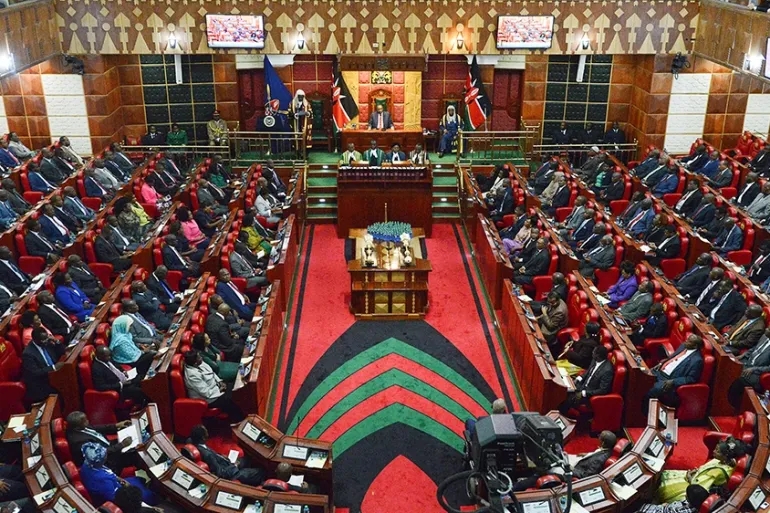More than a half of Kenya's business leaders are pessimistic about the overall growth of the economy, citing the combined impact of the high cost of living and the weakening Shilling.
The Central Bank of Kenya's CEOs survey for July shows that 56.1 per cent have lower expectations for growth compared to 53.5 per cent in May. The other 30.9 per cent believes Kenya's economy will stagnate compared to 25.7 per cent three months ago while only 13 per cent think that the country's economy is moving in the right direction.
Consequently, they expect that business activities will remain muted in coming months on account of high interest rates, the political situation in the country, pending bills impacting cash flow and the weakening Kenyan shilling.
The cost of borrowing has gone up in the past year as the apex bank fights to ease the high cost of living that has started to decelerate after remaining above 7.5 per cent since July last year.
CBK recently retained the base lending rate at 10.5 per cent after a radical 100 basis points increase, pushing the cost of borrowing to an average of 14 per cent.
Last month, the monthly inflation rate, as measured by the Consumer Price Index (CPI), eased to 7.3 per cent from 7.9 per cent in June, the second consecutive drop since June this year and the lowest level in a year since the rate of 7.9 per cent in May 2022.
The drop in the cost of living was largely driven by a fall in the price of several basic food items, electricity, and cooking gas.
However, CEO's polled expressed optimism that the reducing inflationary pressures, expected improved performance of the agricultural sector coupled with the state focus on the digital economy could drive growth.
Business activities in 2023 Q2 improved slightly compared to 2023 Q1.
Increased business activity was reported for firms in financial and ICT services, as well as the agriculture sector, with the latter benefiting from improved exports.
Nevertheless, respondents reported that while business activity improved, increased fuel taxes, expensive food and commodities had reversed some of the gains.
Respondents highlighted increased taxation, the cost of doing business and the economic environment (high inflation and the weakening Shilling) as domestic factors that could constrain growth in the near term.
Externally, firms highlighted global inflation, potential macroeconomic volatility and energy prices as threats to their expansion.
They expect to mitigate these constraining factors through management of costs and risks, diversification of their businesses, and digitisation of their operations.
The rate of those expecting demand, production and sales to rise in the coming quarter ending September 30 reduced by an average of 15 per cent.
Those expecting demand to rise in the coming three months was 33.6 per cent, same percentage with those who thinks the demand will fall. The remaining 32.8 per cent hope that the demand will stagnate.
The number of CEOs expecting production to remain the same rose to 40.2 per cent. Those expecting it to decrease also rose to 34.2 per cent while 25.6 per cent expect the level of production to grow by end of September.
Majority of CEOs at 38.7 per cent expects sales to remain muted on high purchasing cost while 32.8 per cent are pessimistic about sales volumes in coming days. only 28.6 per cent hope that their sales will improve.
As a result, 82.4 per cent expects prices of goods and services to increase in coming months, with only 15.1 per cent forecasting muted growth while the remaining 2.5 per cent hopes that prices will drop.
Majority of the captains of industries at 67.5 per cent have no plans to hire more employees, with 20 per cent planning to downsize. The remaining 12.5 per cent are optimistic about adding the number of staff in coming months.
In terms of sectoral demand in the second quarter of 2023, majority of firms in agriculture sector reported higher orders at 50 per cent compared to 33.3 per cent who expect it to remain muted. The remaining 16.7 per cent are hopeful that order numbers will improve.
"While agricultural output will likely be supported by the good rainfall, orders and sales are likely to remain subdued due to the high cost of living and high food prices,'' the report reads.
For the manufacturing sector however, majority of respondents reported lower demand.
Majority of firms in the services sector expects the production, demand and purchase price to stagnate. The sector accounts for close to 60 per cent of Kenya's GDP.
Optimism for global growth remained largely the same with respondents noting that risks to global growth remained unchanged, notably the war in Ukraine and the subdued global economic outlook.
















